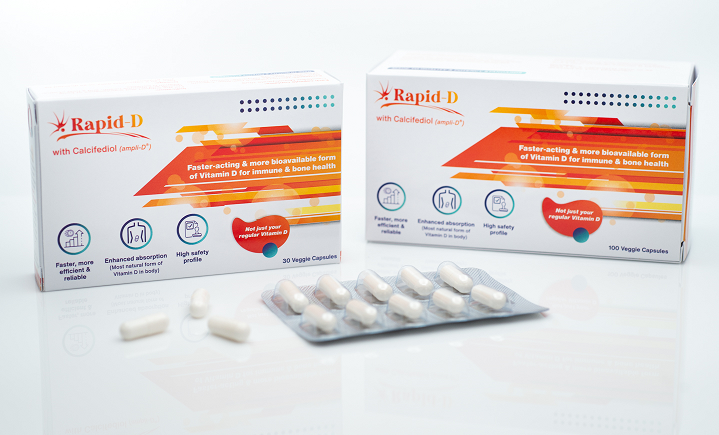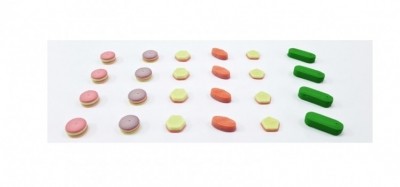Singapore firm MD Pharmaceuticals and DSM develop ‘faster-acting’ vitamin D supplement to boost immunity

Known as Rapid-D, the halal-certified and 100 per cent vegetarian capsule product contains ampli-D – a form of vitamin D3 known as calcifediol or 25-hydroxyvitamin D3 and is a trademarked ingredient by DSM.
In Singapore, MD Pharmaceuticals also enjoys exclusive mass-market distributorship rights for this ingredient in Singapore.
A trial published in Osteoporosis International showed that calcifediol is clinically proven to work 3.2 times faster as compared to cholecalciferol – another form of vitamin D3. The latter is also the more commonly used type of vitamin D3 in supplements.
“We have observed that demand for vitamin D has increased in the last couple of years as retail consumers have become more self-informed and seek immune support products which are backed by strong scientific evidence.
“Some medical professionals, especially the infectious disease specialists, have been highlighting vitamin D’s immune support benefits in a more public manner when talking about COVID-19, which has led more medical professional as well as individuals to take note and read up more about its importance on the human body.
“This has essentially pushed vitamin D into the spotlight,” said Melvin Wong, CEO of MD Pharmaceuticals.
Prior to COVID-19, vitamin D use for musculoskeletal and immune health has already gained recognition among medical professionals.
The product is sold in a box of 30 capsules in selected general practitioner and specialist clinics, as well as the retail pharmacies of Ng Teng Fong General Hospital and Singapore General Hospital.
Last year, DSM also partnered with Australian practitioner-only brand Bioclinic Naturals in launching the world’s first supplement containing ampli-D.
The difference?
To compare the difference between calcifediol and cholecalciferol, MD Pharma conducted a study and found that supplementation of Rapid-D, which contained calcifediol, could raise vitamin D levels from insufficient to desirable levels in four weeks.
An insufficient blood serum vitamin D level is between 10 and 29.9ng/ml, while a desirable level ranges from 30 to 99.9 ng/ml.
Anything below 10ng/ml is considered deficient and overtly high amounts, at 100ng/ml and above could indicate possible toxicity.
Conducted on three Singaporean participants, the study found that two out of the three had insufficient vitamin D in their blood, while the third person recorded a desirable level of 30.1 ng/ml.
The two participants with insufficient vitamin D levels took rapid-D at 20ug/day and the third participant took rapid-D at 10ug/day for a month.
All were found to have achieved a sufficient vitamin D status of more than 30ng/ml, with substantial increases in their vitamin D levels ranging from 19.3 to 42.9 ng/ml within four weeks.
The company explained that calcifediol was more effective as it entered the body as a natural and common form of vitamin D circulating in the blood, thus bypassing the usual necessary first hydroxylation step in the liver.
Hence, it is more immediately available to be active for the body’s use.
In contrast, cholecalciferol has to go through the liver to be converted into 25-hydroxyvitamin D3 and then again through the kidneys to be turned into 1,25-dihydroxyvitamin D3, which is the active form of vitamin D.
Patients with liver impairments or those medications that affect liver enzyme activity could thus potentially experience the benefit of vitamin D supplementation on their health faster with the use of this product, according to MD Pharma.
Aside from immune health, the product can also be of use for consumers suffering from hypocalcemia (low calcium levels in blood), osteomalacia (soft bones), and those at risk of osteoporosis.
The product can also help raise vitamin D levels in patients who are about to undergo orthopaedic surgery, as low vitamin D levels prior to surgery may impact bone remodelling and post-surgery recovery, according to the firm.
Reception from medical professionals
Aside from vitamin D, there is also interest in supplements targeting specific medical conditions and are experienced by a large portion of the population.
They include chronic conditions such as high cholesterol, high blood pressure, diabetes, arthritis, dementia, insomnia, mental stress and obesity.
“That said, to be prescribed by the medical professionals, the efficacy of such supplements should be evident in patients within a reasonable amount of time.
“Safety of the product is also paramount as these are to be taken daily and for the long term.
“Generally, only efficacious supplements with creditable clinical and scientific evidence, published in reputable nutritional or medical journals will continue to gain the interest of the medical practitioners,” Wong said in response to queries from NutraIngredients-Asia.
The clinical trials will also need to involve a larger sample size and conducted over a longer duration. Some medical practitioners also insist on seeing evidence from locally conducted clinical trials, he added.



















